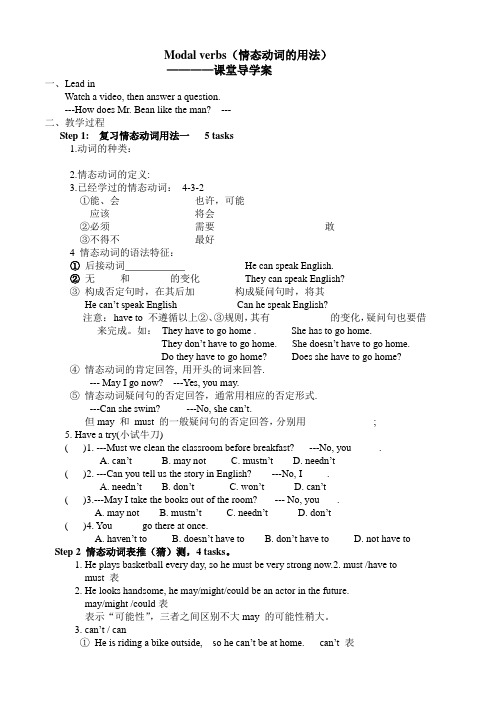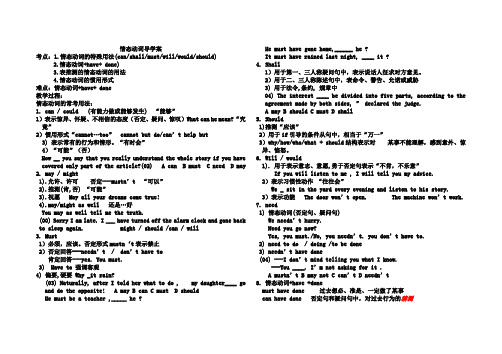英语情态动词用法导学案
情态动词用法导学案

Modal verbs(情态动词的用法)————课堂导学案一、Lead inWatch a video, then answer a question.---How does Mr. Bean like the man? --- _____________________二、教学过程Step 1: 复习情态动词用法一 5 tasks1.动词的种类:_________________ __________________________________ _________________2.情态动词的定义:___________________________________________________3.已经学过的情态动词:4-3-2①能、会____________ 也许,可能___________应该______________ 将会_________________②必须___________ 需要________________ 敢_______________③不得不_________ 最好_____________________4 情态动词的语法特征:①后接动词____________He can speak English.②无_____和______ 的变化They can speak English?③构成否定句时,在其后加______ 构成疑问句时,将其_____He can’t speak English Can he speak English?注意:have to 不遵循以上②、③规则,其有_____ _____的变化,疑问句也要借_____来完成。
如:They have to go home . She has to go home.They don’t have to go home. She doesn’t have to go home.Do they have to go home? Does she have to go home?④情态动词的肯定回答, 用开头的词来回答.--- May I go now? ---Yes, you may.⑤情态动词疑问句的否定回答,通常用相应的否定形式.---Can she swim?---No, she can’t.但may 和must 的一般疑问句的否定回答,分别用____________ ; _____________5. Have a try(小试牛刀)( )1. ---Must we clean the classroom before breakfast? ---No, you _____.A. can’tB. may notC. mustn’tD. needn’t( )2. ---Can you tell us the story in English? ---No, I_____.A. needn’tB. don’tC. won’tD. can’t( )3.---May I take the books out of the room?--- No, you ___.A. may notB. mustn’tC. needn’tD. don’t( )4. You _____ go there at once.A. hav en’t toB. doesn’t have to B. don’t have to D. not have toStep 2 情态动词表推(猜)测,4 tasks。
高一英语 learning about language 情态动词的用法导学案 新人教版 学案

You had better have come earlier. 你本该来得早一点。
Need you go yet? 你要走了吗?
Yes, I must. / No, I needn't.是的,我要走了/不,不急着走。
ShouldIopen the door?
4) should + have done
You should have started earlier.
7.ought to
1) 用于第一人称,表有责任或有必要做某事。
We ought to be more careful with our homework.
We ____have received the letter yesterday , but it didn’t arrive .
备注
教(学)后反思
拓展提升
备注
用适当的情态动词填空
Ihave not a raincoat with me .that is whyI_______ wait until the rain stops .
_____I water the trees onTuesday ?
----- No ,you needn’t.
He is so strong that I ____fight against him.
例如:
You don't have to tell him about it. 你不一定要把此事告诉他。
You mustn't tell him about it. 你不得把这件事告诉他。
情态动词的用法 教案

情态动词的用法教案一、教学目标1、让学生了解常见情态动词的基本含义和用法。
2、帮助学生掌握情态动词在不同语境中的正确运用。
3、培养学生运用情态动词进行准确表达和交流的能力。
二、教学重难点1、重点(1)常见情态动词 can, could, may, might, must, should, ought to, shall, will, would 的基本用法。
(2)情态动词在表示推测、许可、义务、建议等方面的用法。
2、难点(1)情态动词在不同语境中的细微差别和准确运用。
(2)情态动词与虚拟语气的结合运用。
三、教学方法1、讲授法:讲解情态动词的基本概念和用法。
2、练习法:通过练习题巩固所学知识。
3、情境教学法:创设情境,让学生在实际情境中运用情态动词。
四、教学过程1、导入(5 分钟)通过展示一些包含情态动词的句子,如“You can do it” “He must be very tired” 等,引导学生思考这些句子中情态动词的作用,从而引出本节课的主题——情态动词的用法。
2、知识讲解(20 分钟)(1)can 和 could表示能力:can 表示现在的能力,could 表示过去的能力。
例如:“I can speak English” “He could play the piano when he was five”表示许可:can 用于现在或将来的许可,could 用于比较委婉的请求许可。
例如:“You can leave now” “Could I use your phone?”表示可能性:can 常用于否定句和疑问句中表示可能性,could 语气更委婉。
例如:“It can't be true” “Could it be a mistake?”(2)may 和 might表示许可:may 用于正式场合或书面语,might 更委婉。
例如:“You may come in” “Might I ask a question?”表示可能性:may 比 might 可能性大。
情态动词导学案

情态动词导学案考点:1.情态动词的特殊用法(can/shall/must/will/would/should)2.情态动词+have+ done)3.表推测的情态动词的用法4.情态动词的惯用形式难点:情态动词+have+ done教学过程:情态动词的常考用法:1.can / could (有能力做或能够发生) “能够”1)表示惊异、怀疑、不相信的态度(否定、疑问、惊叹)What can he mean?“究竟”2)惯用形式“cannot…too” cannot but do/can’t help but3) 表示常有的行为和情形。
“有时会”4)“可能”(否)How __ you say that you really understand the whole story if you have covered only part of the article?(02) A can B must C need D may 2. may / might1).允许、许可否定---mustn’t“可以”2).推测(肯,否) “可能”3).祝愿 May all your dreams come true!4).may/might as well 还是…好You may as well tell me the truth.(00) Sorry I am late. I ___ have turned off the alarm clock and gone back to sleep again. might / should /can / will3. Must1)必须,应该。
否定形式mustn‘t表示禁止2)否定回答---needn’t / don’t have to肯定回答---yes. You must.3) Have to 强调客观4) 偏要,硬要 Why _it rain?(03) Naturally, after I told her what to do , my daughter____ goand do the opposite! A may B can C must D shouldHe must be a teacher ,_____ he ? He must have gone home,______ he ?It must have rained last night, ____ it ?4. Shall1)用于第一、三人称疑问句中,表示说话人征求对方意见。
高一英语教案-高一英语必修3第2单元导学案情态动词II

高一英语必修3第2单元导学案情态动词(II)导学案4情态动词(ii)一、ought to 应该,应当其否定“ought not to” 或“oughtn’t to” (1) 用于第一人称,表有责任或有必要做某事。
we ought to be more careful with our homework. (2)用于二、三人称,表建议或劝告。
you ought tofollow your teacher’s advice. she ought not to go alone. (3) ought to+have done: 本该……i’m sorry.i ought to have told you this morning.对不起,我本该今天早上告诉你的。
二、have to / don’t have to / mustn’t (1) haveto = have got to 必须,不得不(有人称和数、时态的变化)he has to work on the farm all day . 他不得不在农场工作一整天。
(2)don’t have to 不必……you don’t have to buy a computer. (3)mustn’t禁止,不许you mustn’t sleep in class!三、need 需要,必要(既可以作情态动词,也可以作实义动词,但用法不同)(1)作为情态动词,need 通常用于否定句和疑问句①you needn’t buy the book.. ②――need he do his homework first?――yes ,he must! (no ,he needn’t) (2) need 作为实义动词时,通常用法是: sb/sth need to do (表主动) we need to tell himthe truth. sb/sth need doing /to be done(表被。
九年级英语教学设计导学案(情态动词)

t; can 14.—The book report is very important. You ________ write it carefully. —But I ________ hand it in now. A.must; must B.have to; must C.must; have to D.have to; have to 15.It is 11:00 p.m now. Peter hasn't come back yet. His mother ______ be very mad
三、加强思维
6.I’ve bought a nice necklace for Jo’s birthday. She _____like it, but I’m not sure. A.can B.may be C.might D.must 7.The designer has tried every possible way to make the robot light, so you _____
导学设计
9.—Can we walk across the road now?
—No, we. We have to wait until the light turns green.
A.couldn’t B.needn’t C.shoul heard about the temperature of the earth will rise to 59℃ in 2020?
at him. A.may
B.can
C.must
D.need
1-5:BDCAA 6-10:CDADB 11-15:BCDCC
2/3
导学设计
3/3
情态动词的基本作法教案

情态动词的基本用法教案一、教学目标:1. 让学生掌握情态动词的基本形式和用法。
2. 培养学生运用情态动词进行日常交流的能力。
3. 提高学生对英语语法的学习兴趣。
二、教学内容:1. 情态动词的定义和分类。
2. 情态动词的基本形式。
3. 情态动词的用法和句型结构。
4. 情态动词的练习和应用。
三、教学重点与难点:1. 重点:情态动词的基本形式和用法。
2. 难点:情态动词在特定情境下的运用。
四、教学方法:1. 讲授法:讲解情态动词的定义、分类和基本形式。
2. 互动法:引导学生进行情态动词的练习和应用。
3. 任务型教学法:通过小组活动,让学生在实际情境中运用情态动词。
五、教学过程:1. 引入:通过情景对话,引导学生关注情态动词的用法。
2. 讲解:讲解情态动词的定义、分类和基本形式。
3. 练习:设计不同情境下的情态动词练习题,让学生进行互动练习。
4. 应用:分组进行角色扮演,运用情态动词进行对话。
5. 总结:对本节课的内容进行总结,强调情态动词的用法。
教学评价:1. 课堂参与度:观察学生在课堂上的积极参与情况和提问回答。
2. 练习正确率:检查学生在练习中的正确率,及时给予反馈。
3. 对话表演:评价学生在角色扮演中的语言表达和运用情态动词的能力。
六、教学准备:1. 教学PPT:包含情态动词的基本形式和用法。
2. 练习题:设计不同情境下的情态动词练习题。
3. 角色扮演卡:提供不同角色和情境的卡片。
4. 教学录音机:用于播放情景对话。
七、教学步骤:1. 复习:复习上节课学习的情态动词的基本形式和用法。
2. 练习:让学生完成练习题,巩固情态动词的知识。
3. 情景对话:播放一段含有情态动词的情景对话,让学生跟读并理解。
4. 角色扮演:学生分组进行角色扮演,运用情态动词进行对话。
5. 小组讨论:让学生分组讨论情态动词在实际生活中的应用。
八、课堂活动:1. 游戏:设计一个情态动词的游戏,让学生在游戏中巩固知识。
2. 竞赛:组织一个情态动词知识竞赛,激发学生的学习兴趣。
情态动词导学案

高一英语情态动词导学案【明确目标】1、掌握情态动词的用法2、能够运用所学情态动词知识进行熟练对话。
【自学指导】概说:情态动词表示说话人的语气和情态,需要,可能,愿意和怀疑等。
情态动词有一定的词义,但不完整,必须和主要动词的原形一起构成谓语。
常用的情态动词有:can, could, may, might, must, have to, ought to, need, dare, shall, will, should, would, be able to, etc.一. can , could, be able to用法I. 1) can 表示体力或脑力方面的能力,或根据客观条件能够做某事的能力。
A blind man can not judge color.He can speak five languages.2) 表示许可,在疑问句中表示要求,否定句中表示不许。
Can (May) I come in ?----- Can I use your dictionary?----- Of course, you can.3) 表示可能性,常用于疑问句和否定句中.Can it be true?Can the hall seat a thousand people?Someone is knocking at the door. Who can it be?She can’t be here.Mary can’t have gone there alone. 4) be able to与can 的比较A) 表示能力时可通用No one can / is able to do it.Can you come tonight? /Will you be able to come tonight?B) 表示经过努而成功地办到了某个具体的事情时,只能用be able to 不可用 can。
With the help of the firemen, they were able to leave the burning house.After years of hard work he was able to win the prize.2. could1) could 是can的过去时,除具有can的各种功能外,还可以用来比较委婉,客气地提出问题或陈述看法。
- 1、下载文档前请自行甄别文档内容的完整性,平台不提供额外的编辑、内容补充、找答案等附加服务。
- 2、"仅部分预览"的文档,不可在线预览部分如存在完整性等问题,可反馈申请退款(可完整预览的文档不适用该条件!)。
- 3、如文档侵犯您的权益,请联系客服反馈,我们会尽快为您处理(人工客服工作时间:9:00-18:30)。
情态动词讲解一.概念引入情态动词表示一种情感和态度,是___________________(实义动词or 助动词),它本身语义不完整,要和实义动词一起使用,后接动词的____________形式。
注:实义动词即行为动词,表示动作的动词,可单独使用做谓语。
与实义动词相对应的是非实义动词,包括(帮助构成时态、语态的)be动词,(帮助构成时态、强调、虚拟的)助动词(do / does / did, have / has / had)以及情态动词。
eg. I did a lot of homework today, and I felt satisfied.People do love to have holidays for various reasons.情态动词有_________________________________________________________________________________________________。
二.基础讲解can / could1. 表示_______________.eg. My grandma is 80 years old, but she can drive without glasses.2. 表示________________, could 可以代替can, 表示语气较为委婉。
eg. They asked whether they could smoke in the hall.Could you please pick me up at the airport at 5 p.m. next Monday?3. 表示推测或理论上的可能性,意为_________________.eg. I thought the story could not be true.Even an experience teacher can make mistakes.may / might1. 表示_______________, 它的否定形式可以用may not,但表示“强烈禁止”等意思时常用_______________.eg. May I turn up the radio a little?He said that I might use his telephone.2. 表示______________的推测, might 比may 的语气更弱。
e g. Our football team didn’t p lay well today, but we might do better tomorrow.3. 表示_____________.eg. May you succeed! / May you live a happy life.will / would1. 表示_________________.eg. I have told him to stop smoking many times, but he will not listen.2. 表示询问意愿或提出请求。
eg. Will you give him a message when you see him?Would you like to join the football club?3. 表示___________的动作,意为_______________; will表示现在,would表示过去。
eg. She will sit for hours reading in the afternoon.We would sit around grandpa after supper, listening to his stories when we were young.4. 表示________________________________.eg. Wood will float on the water.The door won’t open.注:would vs used towould和used to都可表示____________的习惯性动作,但used to暗含现在已不这样。
eg. People _________________ to believe that the earth was flat.shall / should / ought to1. shall 用于第一和第三人称的疑问句,表示征求对方意见或许可。
eg. 我们能否将运动会推迟到下月。
__________ __________ __________ __________ __________ ____________ ___________ until next month?2. shall 用于第二和第三人称的陈述句,表示_________、_________、_________等。
Eg. You shall be punished if you break the rule.You shall pay more attention to your behaviors next time.You shall get a gift if you do well in your exams.3. should 表示劝告和建议,作“应该”讲,和ought to相似,ought to语气更重。
eg. 我认为孩子应该好好尊敬长辈。
I think _________ __________ really _________ ________ _________ _________ __________.注:ought_______(有/无) 形式的变化,其否定式为___________________,疑问式将____________ 提至主语之前。
eg. ---Ought he to see the doctor?---Yes, he _________________.4. should 表示诧异,意为_______________.Eg. It’s strange that she should do such a thing.It was so moving that they, so poor themselves, should bring me food.must / have to1. must 表示___________, _____________, 在回答must 问句时,否定式常用_____________, _____________________ 表示“不必”,因为mustn’t 表示____________________.Eg. Must I have a driver’s license if I want to drive a car?---Must I be home before eight o’clock, Mum?---No, you __________________________________.翻译:司机喝酒后严禁驾车。
_____________ ______________ _____________ ______________ _______________.2. 表示主观的推测,意为____________________, 一般只用于肯定句中,表示不可能用_____________.eg. He has got the first place three times. He must be very smart.He cheated in the exam? That __________ be true.must vs have tomust 表示说话人的主观看法, have to 表示客观需要; have to 有更多的形式(had to),还可以用have got to 代替。
eg. I can’t see things clearly. I _____________ wear glasses.You ___________ be honest.练习:1. You ___________ smoke in public places.2. The radio is broken. I _____________ to buy a new one.3. I don’t like this radio. I _____________buy a new one.4. You don’t ______________ worry about that.三.情态动词+ 完成时1. 表示对_____________发生事情的推测_____________ + have done 一定…了____________________ + have done 不可能…了____________________ + have done 也许…了eg. The work was beyond his ability, so he __________________________ (finish) it by himself.She _________________________(wipe) the table, for the table is very clean.He ___________________________ (might, hurt) seriously in the car accident.2. 表示___________的情态动词+ have doneshould (not) have done _____________(而没做),_______________(而做了) eg. You should have taken more exercises before.You shouldn’t have let out the secret to her.could have done ____________________(而没有)eg. She could have done the job better, but unfortunately, she didn’t perform well that day. needn’t have done _____________________(而做了)eg. You needn’t have come to see me, since you have such a busy schedule.四.练习写出下列句子中情态动词的功能用法或含义1. ---Who can it be that is knocking at the door?--- It may be the postman.2. The car won’t start.3. May you succeed!4. During the vocation, he would visit me every week.5.He must be reading now, for the light in his room is still on.6. If you don’t finish your homework first, you shall not go to the party.完成句子1. I was really anxious about you. You ________________________(leave) home without a word.2. The police still haven’t found the lost boy, but they’re doing all they __________.3. The traffic is heavy these days. I _______________arrive a bit late, so could you save me a place?4. What do you mean, there are only ten tickets? There __________ be twelve.5. Doctors say that exercise is important for health, but it ____________be regular exercise.6. When we were young, we ______________ gather together to see our favorite shows.7. I hope to have car of my own so that I ________________ compete with others for space on crowded buses.8. “You ___________ have the wrong number, for there is no one of that name here”.9. The accident _____________________________(avoid) if the driver had been more careful.10. Your eyes are really red. You _______________________(go) to bed late last night.11. I actually _______________________(bring) so much wine --- only three people came.。
